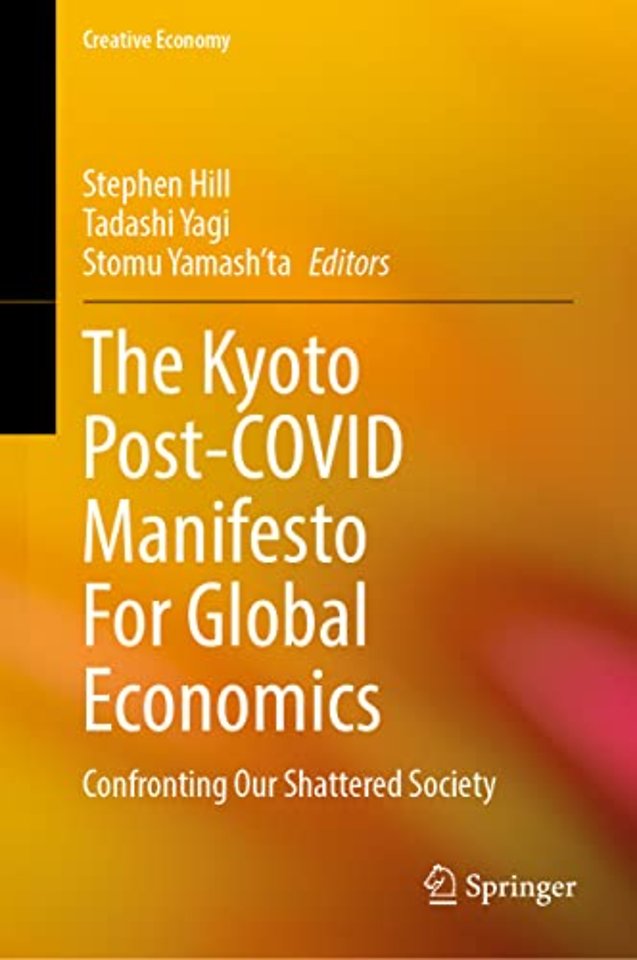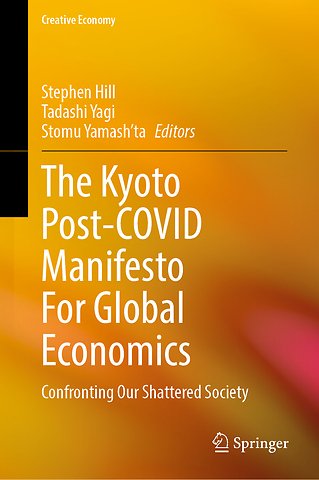The Kyoto Post-COVID Manifesto For Global Economics
Confronting Our Shattered Society
Samenvatting
This book, The Kyoto Post-COVID Manifesto for Global Economics (KM-PC), is a sequel to our 2018 book, The Kyoto Manifesto for Global Economics (KM-I, 2018). It further exposes the failures of a global economic regime that, based on self-interest, has led to the enormously unequal and fragmented society of today and our decreased ability to respond and recover from the critical worldwide consequences of such a regime over time — notably, climate change. At stake is our very survival beyond the twenty-first century.
The fundamental tenet of this book is that our power to heal our currently fractured society lies in the depth of our humanity — in our shared human spirit and spirituality. What is sacred or of imperishable supreme value is what we can be as a human race: empowered, fulfilled individuals, living in harmony, deeply sharing and caring for one another and the environment that sustains us across our distinct cultures and worlds in which we live. Thus, the norms in our economic relations do not have to be those of self-interest that separates us, the ever-watchful distrust represented by “the deal” and immediate economic advantage for me. Instead, we can build an economic frame for our society based on mindfulness, care, mutual human benefit, and trust — on our shared humanity.
Our argument was complete and we were ready to publish. But then, suddenly, from the dawning of 2020, everything changed. COVID-19 invaded and the world as we knew it simply stopped. No one saw it coming. As authors, we waited to watch and seek to understand. The result is that the book captures the COVID trauma and, against the fractures based on self-interest already visible in today’s society, assesses the impact of COVID-19 now and for the future. Focusing on a humanity-based economics is even more important now, and this book shows why.
Chapter 15 is available open access under a Creative Commons Attribution 4.0 International License via link.springer.com.
Specificaties
Inhoudsopgave
<p>Chapter 1: “Confronting Our Shattered Society”: Stephen Hill</p>
<p>Chapter 2: “Embracing the Circle of Wholeness”: Stephen Hill</p>
<p>Chapter 3: “Polyphony as a System for Delivering Co-creation, Empowerment, Sustainability and Trust”: Tadashi Yagi and Stomu Yamash’ta</p>
<p>Chapter 4: “Creating an Economy of Care”: Stephen Hill</p>
<p>Chapter 5: “Universal Care – Including the Excluded”: Stephen Hill</p>
<p>Chapter 6: “Sustainability Conditions for Universal Basic Income in the Economic Recession Caused by COVID-19”: Tadashi Yagi </p>
<p>Chapter 7: “Towards the Reconstruction of the Cosmos: In Consideration of a Polyphonic Way of Life”: Toshiaki Maruyama<br> <br> </p>
<p> </p>
<p>SECTION 2 Dimensions of Transformation - Complexity and Wholeness</p>
<p>Chapter 8: “ Achieving Transformation in Our Highly Interconnected World – I: Systems Thinking and Network Thinking”: Len Fisher</p>
<p>Chapter 9: “Achieving Transformation in Our Highly Interconnected World – II: The Role of the Individual”: Len Fisher</p>
<p>Chapter 10: “Transdisciplinary Study of How to Integrate Our Shattered World: The Self-Non-Self Circulation Principle of ‘Living Wholeness’: Masatoshi Murase and Tomoko Murase</p>
<p>Chapter 11: “The Self-Non-Self Circulation Principle of ‘Living’ Nature: How to Survive Our Shattered World”: Masatoshi Murase and Tomoko Murase</p>
<p>Chapter 12: “A Case Study of the Self-Non-Self Circulation Principle in Action – Towards a New Synthesis beyond Division between Inside and Outside Worlds in Nursing” </p>
<p>Chapter 13: “Taiji: - Philosophical, Cultural and Educational Views from Tian Zhen Yuan”: Xing Qi Lin, Translation by Dr. Cui Ai Ling and Dr. Corinne Koo</p>
<p> </p>
<p>SECTION 3 Achieving Sustainable Life – The Circular Economy Movement</p>
<p>Chapter 14: “Systemic Change Driven by Circular Change”: Ladeja Godina Kosir </p>
<p>Chapter 15: “The New Natural State of the Market”: Einer Kleppe Holthe</p>
<p>Chapter 16: “The Role of Sustainable Resource Management in an Economy We Want”: Janez Potocnik</p>
<p>Chapter 17: “Stewarding System Aliveness – Pathways to Transformation”: Petra Kuenkel and Elisabeth Kuhn</p>
<p>Chapter 18: “From Sustainability to Thrivability: Transforming Systems with Purpose”: Alexander Laszlo, Karin Huber-Heim and Stefan Blachfellner</p>
<p> </p>
<p>SECTION 4 Conclusion: From Our Shattered Society to a New Economics</p>
<p>Chapter 19: “Where Did Humanity Go?” Stephen Hill, Tadashi Yagi and Stomu Yamash’ta</p>
Chapter 20: “Discovering Our Humanity – Economics of the Future”: Stephen Hill, Tadashi Yagi and Stomu Yamash’ta

